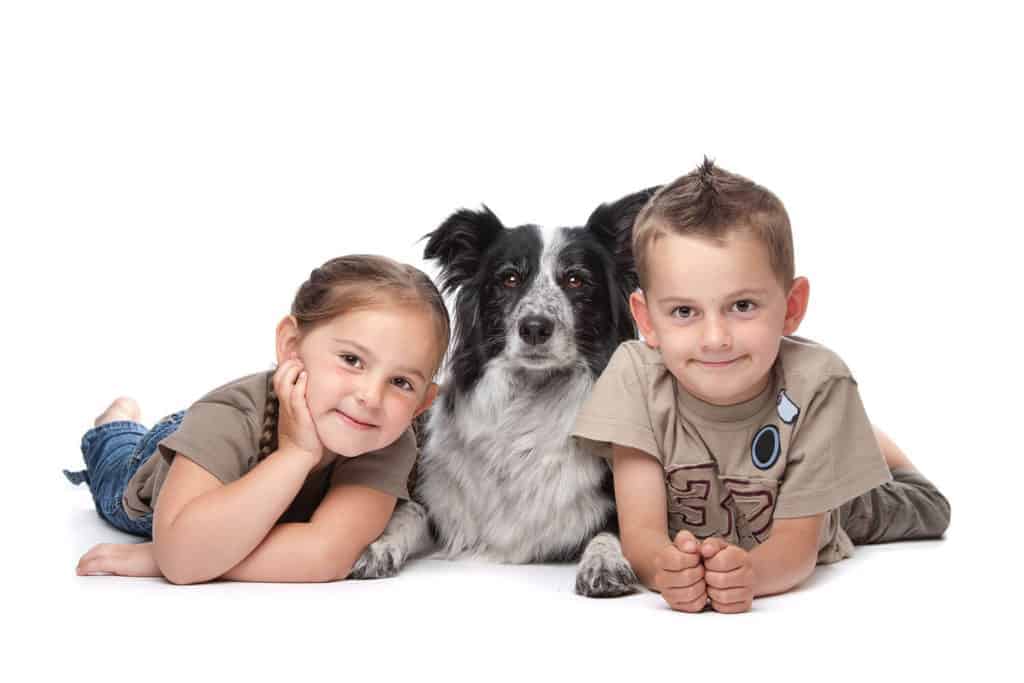
Just like a lot of things, sometimes children are scared of dogs. If you want to help your little one get over that fear, the best way is to have him grow up in a house with a dog. Let him become a new dog owner.
Below are the best dog breeds for a shy or apprehensive child, the least scary dogs if you will, some tips on whether to go with a puppy or an adult, and advice on how to help your child feel better with a dog friendly face!
In no particular order, the best dog for a scared child include
- Collies
- Beagles
- Poodles
- Labrador Retrievers
- Golden Retrievers
- French Bulldogs
- Newfoundlands
- Sealyham Terrier
- Dachshunds
A dog can be a great teacher; children learn responsible behavior, gain healthy self-esteem, and other important traits that will positively define their personality.
All dogs will help your child learn that these furry beasts are kind, friendly, and funny. A dog is a loyal and loving friend to have around the house.
The dogs we listed are fun to train, and they’re great dogs, fantastic family companions for those looking for easy additions to their lives overall. Let’s take a closer look!
1. Collies
Collies are kind, loving dogs above all else. They have kind expressions and warm eyes that just lure in even the more scared child to getting to know them.
Collies have long fine fur that requires regular grooming to keep them snarl-free. Since grooming is a fantastic way for your child and his new doggo to bond, this is going to work out well!
Mid-sized, these energetic dogs will love to play with your child but won’t be so big that they will cause injury to them by accident.
2. Beagles
The main feature to love about beagles is that they are serious family dogs. Hating to be left alone, they’ll quickly become your kid’s bestie because they’ll just follow them around everywhere that they go!
They’re also easy to train because it means more time with you and pleasing you! Beagles are curious dogs, but it’s focused more on seeing what their favorite humans are getting into rather than anything else.
They love to hike and follow scents through the woods; this is a great dog breed for those families who love camping and otherwise be outside. With short, wiry fur, they’ll be relatively easy to groom, and it makes a great daily chore for your little one!
3. Poodles
A poodle is going to be the most loving and loyal best friend your fearful child can have! Living solely to please and entertain their humans, these dogs love to train and easily remember all the tricks you teach them.
With a thin coat that is fun to pet, this is easy to care-for for stress-free dog owning. Another trait your apprehensive child will love is that poodles are silly dogs and love to make a fool out of themselves simply to hear their dog owner laugh! How much cuter does it get, right?
4. Labrador Retrievers
The main trait of these beautiful dogs is that they are endlessly calm! Even if you’ve got a little one that will start to pet them, then run off screaming, your Lab won’t be offended or upset even!
These dogs are great for children who need an especially long time to warm up to them. Labrador Retrievers do require daily exercise, and they are fantastic dogs for your child to walk because they don’t tend to pull or drag.
They are easy to groom a few times a week and will tolerate small children grooming too hard, which is another fantastic exercise.
5. Golden Retrievers
Without question, the Golden Retriever breed is notoriously amazing as a family dog.
The Golden Retriever loves everyone, especially the children, is patient in playing with them and walking with them, and simply enjoys being the center of attention!
Goofy at times, a Golden Retriever is a moderately energetic dog, can easily be included when going camping, hiking, and anything else. If all else fails, those warm, adorable brown eyes and bright doggy smile are sure winners for curious children!
6. French Bulldogs
Calm and stately, the French Bulldog dog breed is great for children simply because they aren’t going to make any sudden movements.
As young children creep up to them and tentatively pet them, they’ll simply lay there as calm as can be.
Frenchies are couch potatoes and are great for minimal exercise as well as minimal grooming too. They’re a little stubborn when training but are an intelligent breed when they feel like paying attention!
Frenchies are best introduced to children as puppies since they can be a little intimidating in size when they are full grown!
7. Newfoundlands
Okay, so this is a big dog breed. Scary dogs? Not at all. Newfoundlands are indeed large dogs but given the nickname of “gentle giant,” and it’s for a good reason! They are especially kind, warm, and calm.
Their thick fur needs proper grooming, and they require walks, but they are energetic about doing as much as possible with your child.
Perfect playmates and patient if your child tries to climb all over them, these dogs are wonderful for showing shy children or a more timid child that big dogs are nothing to be scared of!
Plus, most kids feel safe with them because of their sheer size!
8. Sealyham Terrier
These adorable dogs are just irresistible to kids, making them especially attractive to those who are fearful.
These are amongst the more energetic dog breeds out there, making them perfect playmates for that matching high-energy child who needs a playmate that can keep up.
Easy to train and groom, these dogs are great at becoming one of the family members easily and will quickly adapt to the needs of various people within the household, too, even if they are different from person to person.
9. Dachshunds
While it’s nice to have a social dog who can hang out with your kids all day, what about the rest of your life? Exactly.
Dachshunds are pretty independent and can easily be left on their own throughout the day when you’re gone to work.
They are calm and loyal and enjoy being around kids. They don’t require excessive amounts of exercise and are easy to care for as far as grooming is concerned.
Why should a child grow up with a dog?
While many families enjoy having a furry companion around from day one, some aren’t so certain.
With kids running around, who has the time or the energy to take care of a dog, too? But, there are many reasons!
Companionship for both
Dogs make wonderful playmates and companions for their children and vice versa.
They can often tire each other out and give the parent a break, too, which you have to love, right?
A reason to get up and move
Most dog breeds have to be given a walk every day. With busy lives and schedules, all too often, families spend their downtime resting on the couch.
While this is great to an extent, growing up with a dog will help your child understand the importance of proper physical health.
They learn how to take care of someone they love
All puppies and dogs will need a little bit of help. Maybe they can’t figure out how to get up or down the stairs.
Maybe they have to learn not to be scared of the grooming brush or nail clippers. Maybe they just need a hug during some fireworks. Your child can bond with a doggo and learn how important it is to take care of them.
They learn to love animals
Even if your little one is not necessarily scared of dogs, growing up with animals in the house will help them to enjoy their presence.
This is an important part of creating empathy; pets teach children respect throughout these fundamental years!
Realistically speaking, it’s not a requirement for your child to have a dog growing up, but it is a great idea to help your child be a strong, loving, kind, and caring individual! Who doesn’t love that, right?
Puppy vs adult: which is better for a scared child?
There are pros and cons to getting a puppy and an adult dog when it comes to your fearful child. Understanding those will help you to choose the right option for your family and household!
Puppy pros
- They’re cute and irresistible
- They’re playful and love to play with your child
- They’re small and approachable
Puppy cons
- They must be trained and cared for properly
- Sometimes they can get rough when playing
- They can take a lot of time throughout the day (relevant to the busy family)
Adult dog pros
- They’re calm and stable with small children and older too
- They’re trained and can easily fit into your family members’ dynamic
- They will be protective of your little one
Adult dog cons
- Their size can be intimidating to very scared children
- They can be hard for your children to walk if they’re full-grown
- Senior dogs may pass away while your child is still young
How to help a child get over the fear of dogs

If you’re a dog lover, but your child is fearful, you can help them get over their fear of them so that you both can enjoy a doggo in your lives! Here are some tips to help with that.
Prioritize easy communication
The first step to helping your child get over their fear is to have them tell you why they’re scared of dogs and what scares them most about them!
This starts with open and accepting communication between parent and child so that they can feel safe telling you their fears.
Bring your child to see animals at friends’ houses, shelters, etc
Once your child says that they want to get over their fear, start bringing them to shelters, homes of friends and family members, etc., who have dogs.
This will help them get up close and personal with all sorts of different dogs and learn how to be around them comfortably as well.
This should be done gradually, of course, to make sure that your little one is moving through their fear (mild to severe) at their own pace and that it isn’t complicating the problem instead of helping it. They should set the pace as much as possible!
Allow your child to pick out their own puppy or dog
When the time comes for you to bring your own dog home when they feel they are ready, it’s also a great idea to allow your little one to choose the puppy or dog they bring home.
You can choose the breed if you want, or allow them to do that, too! As far as the actual puppy or adult that you bring home, allowing them to choose it is a great way to start their bond off on the right foot as they’ll feel it’s “their” dog!
Move at your child’s pace
From start to finish of the desensitization process of the fear, it’s important to move at your child’s pace, just like everything else.
A fear of dogs can be made worse if they are simply thrown in at the deep end, and it can even grow into a lifelong fear or phobia.
A child’s fear is as relevant as an adult’s fear, so remember always to be patient and understanding.
When your little one is scared of dogs, the right furry companion can help them understand that dogs aren’t so bad after all!
These listed breeds will help you choose the right ones, and the below tips will give you support in choosing a pup or an adult, and making the fear conditioning process much easier for everyone involved!
